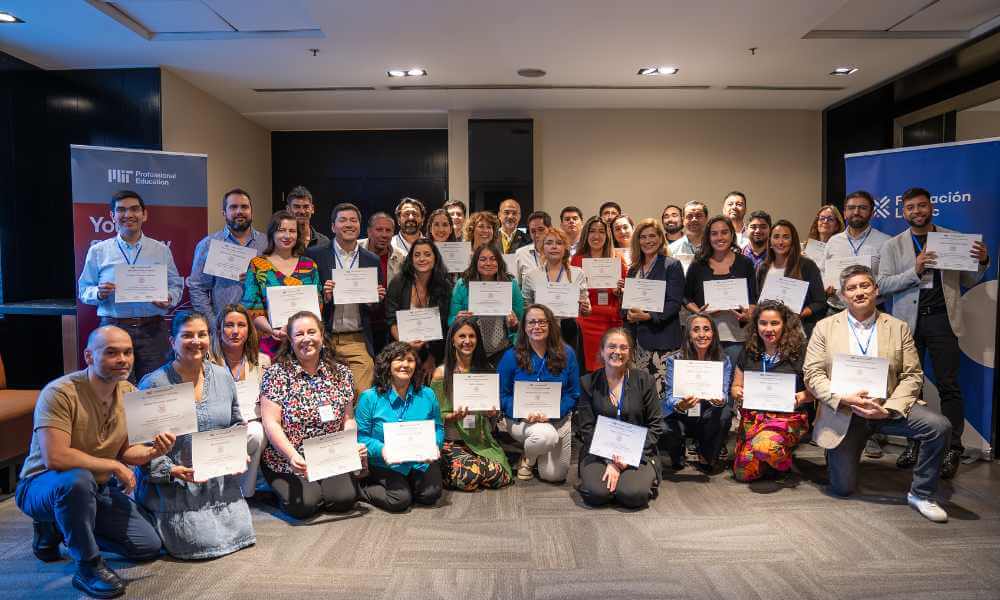The hybrid course “Circular Economy: Transition to a Sustainable Future for Chile”, organized by Fundación Luksic in collaboration with MIT Professional Education, brought together 40 Chilean professionals from various regions to learn about the latest trends in sustainability. Over nine weeks, from July to September, participants explored key topics in circular economy through online modules, webinars with MIT and industry experts, and guided tutorials.
The program concluded in late November with two in-person sessions in Santiago. Participants delved deeper into concepts such as circularity in the real economy, designing and implementing circular systems, and the 9 “R’s” of the circular economy. These sessions were led by Professor Fernández, a sustainability expert and Director of the MIT Environmental Solutions Initiative.
Sixty percent of the participants came from regions outside of Santiago. Montserrat Pérez, a professor at Universidad Católica del Maule, shared her experience: “I’m thrilled because I’ve already started applying this knowledge in the Maule Region. For instance, I conducted a workshop for local entrepreneurs on sustainability and how to integrate it into their businesses. Additionally, I’ll teach an elective course next year on sustainability and innovation, topics I was able to deepen my understanding of thanks to this program.”
Óscar Godoy, an entrepreneur from Nogales in the Valparaíso Region, also applied his learning to a circular economy project aimed at reducing agricultural waste. “We’re using advanced technology in our orchards to create orange powder that can be consumed as freshly squeezed juice, utilizing fruits that often go unsold due to cosmetic reasons. This course was incredibly valuable for advancing this project,” he explained.
Isabella Luksic, General Manager of Fundación Luksic, highlighted that this type of international training program enables world-class expertise to reach Chile, overcoming barriers like language and distance. “It’s been fascinating to see how individuals from diverse backgrounds and experiences have come together: academics, civil society representatives, entrepreneurs, and professionals from the private and public sectors. The discussions on sustainability tailored to Chile’s context have been incredibly enriching, helping us reflect on how to continue sustainably developing the country,” she said.
Circular Economy: A Strategic Opportunity for Chile
“Circular Economy strengthens economic resilience and diversification, providing a safeguard against resource scarcity and supply chain disruptions, ultimately benefiting the economy as a whole,” stated Professor Fernández. He noted that in Chile, this model has particular significance due to its wealth of natural resources: “Effectively managing that natural capital by fostering circular material flows and promoting recycling and reuse is key to protecting it.”
Professor Fernández identified sectors such as mining, agriculture, and services (including transportation and infrastructure) as having significant potential for implementing circularity principles. He also emphasized the importance of the course, noting that the 40 participants are now equipped to immediately apply their knowledge: “These professionals, from various industries, are now able to implement solutions that directly impact the country’s sustainability and resilience,” he concluded.
In closing, the Executive Director of MIT Professional Education, Bhaskar Pant, states “We are so pleased to have been able to offer MIT’s expertise in Circular Economy and Sustainability through Professor John Fernández’s hybrid course which included in-person sessions delivered by Professor Fernández in Santiago addressing specific sustainability challenges faced by Chileans. We look forward to continuing our relationship with Fundación Luksic in further serving professional education needs in Chile.”

